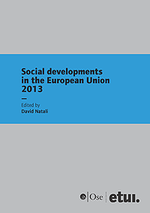Natali, D. (2014) “Social developments report 2013: blueprint for a new European social agenda“, European Social Observatory (ESO), European Trade Union Institute (ETUI), 03 Ιουλίου.
Given the need to jumpstart growth and tackle Europe’s unemployment and investment crisis, this year’s edition of Social developments in the European Union advocates a complete reorientation of the EU’s socio-economic policies. The fifteenth annual report on the state of social Europe, written by the European Social Observatory (OSE) and published by the ETUI, was launched at a well-attended conference at the European Economic and Social Committee in Brussels on 1 July.
David Natali (OSE) opened the conference with a presentation of the publication’s central messages. Social Europe 2013 was, said the publication’s editor, predominantly full of dark shadow (soaring unemployment, rising inequality, increase in poverty levels and growing divergence between EU member states), with also a few bright patches (the social investment package, the EU communication on the social dimension and the partnership for growth, jobs and competitiveness). Overall, however, the crisis had continued and European citizens had lost trust in the European project, as confirmed by the outcome of the recent European elections.
Natali sketched out the options on the table for Europe: either to continue with a minimalist approach to change that would remain within the current paradigm (more stringent coordination of budgetary and welfare policy led by intergovernmentalism) or to adopt a more ambitious agenda for change that could lead to a real EU federation. By way of example, the OSE researcher pointed to a few of the concrete alternatives highlighted in Social developments in the European Union, one of them being a Euro-area-wide unemployment insurance scheme and another a minimum income scheme.
In a reaction to Natali’s presentation, Sofia Fernandes, senior research fellow at Notre Europe, agreed that Europe needs a new paradigm and a common project instead of the survival mode that has characterized its approach in recent years. Referring to Jürgen Habermas, Fernandes proposed ‘defence of the European way of life’ as the mobilizing project on which the EU should focus.
Michele Calandrino, policy officer at the Secretariat-General of the EU Commission, rejected the book’s criticism that the EU had been ‘muddling through’. On the contrary, he stated, there had been ‘great innovation in terms of new governance’ and also a shift in the Commission’s priorities towards the issue of redistribution and inequality.
José Leandro, principal advisor on economic affairs at the Cabinet of EU Council president Van Rompuy, argued along the same lines. Focusing on the need to address rising inequality and poverty (‘we need to prevent Europe becoming a 1% economy’), Leandro referred to the need to ‘kickstart growth’. ‘We need a new growth paradigm based on innovation but one that also addresses ageing, climate change and the environment and brings a new push for investment’, this speaker said.
Some of the elements mentioned by Mr Leandro for an EU agenda of change included overhauling vocational training systems, reforming income support schemes and tax systems, and working to achieve more efficient labour markets.
Last but not least, Freek Spinnewijn, director of FEANTSA, the European Federation of National Organisations Working with the Homeless, argued that the EU needs to become a ‘caring union’. According to this speaker, action for homeless people could and should become one of the quick-win solutions in a redefinition of Europe’s social agenda.
Σχετικές αναρτήσεις:
- Pissarides, C. (2014) “Social Europe In A Climate Of Austerity, The Need For Social Dialogue To Improve Distribution“, Social Europe Journal, 23 Ιουνίου.
- Kowalsky, W. (2014) “Social Europe – In Europe Or In The Member States?“, Social Europe Journal, 12 Μαΐου.
- Faist, Τ. (2014) “On the transnational social question: How social inequalities are reproduced in Europe“, Journal of European Social Policy, Vol. 24, No. 3, σσ. 207-222, Ιούλιος.




